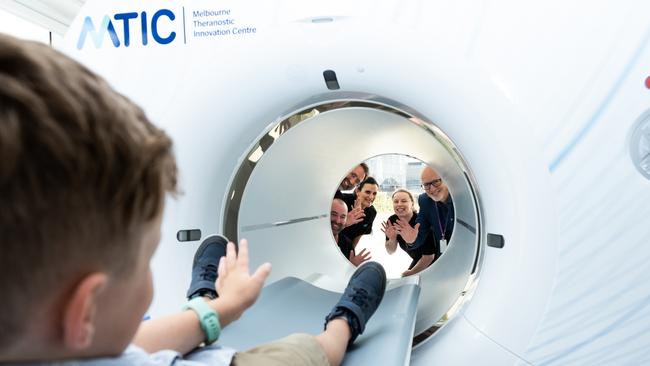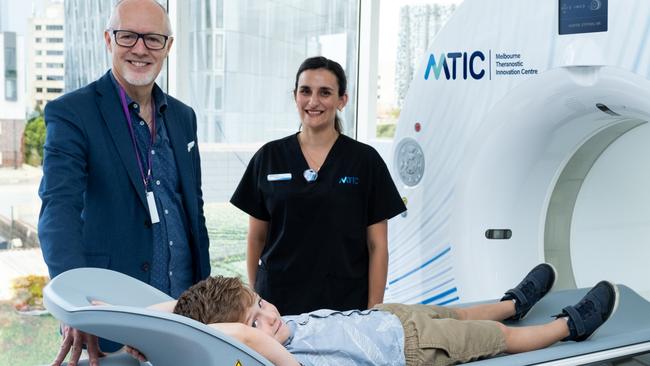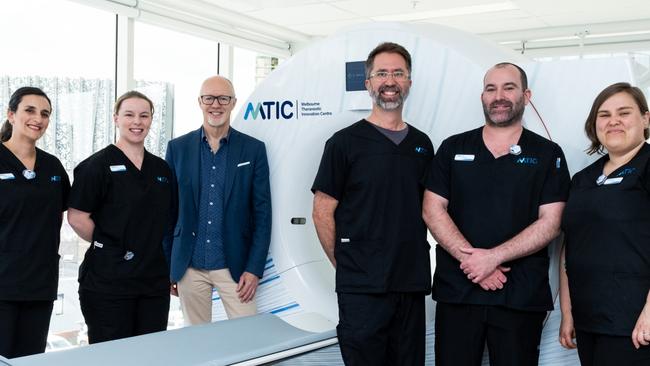The new Siemens Quadra PET and CT scanner will allow medical experts to determine the best treatments for patients
A $13m “whole body” medical imaging scanner unveiled in North Melbourne is the latest weapon in the fight against cancer and heart disease.

Victoria
Don't miss out on the headlines from Victoria. Followed categories will be added to My News.
A unique ‘whole body’ medical imaging scanner set to revolutionise how cancer, brain and heart disease is detected and treated arrived in Melbourne this week, making the city one of the first in the world to offer the new technology.
The first patients have already had images taken by the sleek $13 million Siemens Quadra PET and CT scanner at the Melbourne Theranostic Innovation Centre (MTIC) in North Melbourne. Experts say the scanner will fundamentally change the way these scans are done.
A PET (positron emission tomography) scan is a nuclear medicine imaging test that uses a liquid radioactive material injected into the body to diagnose a variety of diseases.
What makes the Quadra different is that it is 10 times more sensitive than traditional scanners – so it is faster – and it also requires a much lower dose of radiation – so it is safer. It is also the first to simultaneously scan the whole body from the brain to the upper thigh in less than 10 minutes minutes.

For the internationally-renowned nuclear medicine physician Rod Hicks it is the realisation of a pipe dream almost a decade in the making.
“This is precision oncology,” Professor Hicks says with pride.
“Oncology is not one-size-fits-all. This scan will allow us to determine the best treatments for patients; we will know what will work and what won’t work, saving them time, the health budget money and providing patients with bespoke treatment options.”
The oncologist with a knack for design discussed a full body scanner with industrial manufacturing giant Siemens on a speaking tour in Asia some years ago, saying it was the next step to improve the detection of disease using medical imaging technology.
Siemens response was the Quadra, which now takes pride of place at the new headquarters of Melbourne Theranostic Innovation Centre (MTIC) in North Melbourne, one of just 10 such scanners worldwide. Theranostics is the merge of therapy and diagnostics and is at the forefront of new precision
medicine.
With two-time Western Bulldogs president and leading lawyer and public health warrior Peter Gordon, Professor Hicks is the founder of PreMIT, Melbourne’s latest research and development company and part of MTIC.
It is located in the heart of Victoria’s biomedical research precinct in North Melbourne, conveniently close to the Royal Children’s Hospital, the Royal Melbourne Hospital and the Peter MacCallum Cancer Centre.
The services will be offered to all Victorian patients, potentially helping to reduce PET and CT wait times. As the Quadra scan takes around 15 minutes, Professor Hicks predicts they will be able to deliver around 28 PET scans a day in a combination of clinical and research imaging.

Professor Hicks and Peter Gordon say their complementary careers brought them together in the fight for the often unmet needs of Australians living with cancer and other chronic illnesses.
“It is about giving people hope,” Mr Gordon said. “The vision is to bring hope to those receiving clinical treatment based on world-class technology with less radiation and less time needed to get an accurate image.”
The pair formed the company with private investors that include some of Melbourne’s leading business identities; philanthropists working behind the scenes with the shared vision of a democratisation of quality healthcare for all.
The Global CEO of Molecular Imaging for Siemens Healthineers Dr Jim Williams is in Melbourne this week to launch the scanner. He says the installation will make Australia a flagship for precision medicine and health outcomes.
This is yet more good news in the fight against cancer, and comes on the back of the Herald Sun story yesterday revealing exclusively that more than 1000 Australian children diagnosed with cancer each year will be granted access to lifesaving care, thanks to a new nationwide genetic sequencing program.
This new Qandra scan is also good news for children and for pregnant women.
“It will mean children may not need to be sedated to have a scan, and for the first time a PET scan can be offered more safely to pregnant women,” Professor Hicks said.
“I see a future of answers and opportunities for people going through the most difficult time in their lives.
“Theranostics is a key pillar of modern cancer medicine and will enable the translation of personalised medicine from a lofty ideal into reality.
“We aim to scale patient access to new therapies faster and more affordable and ultimately create better outcomes for patients.
“This scanner is not an evolution, it is a revolution of technology.”





